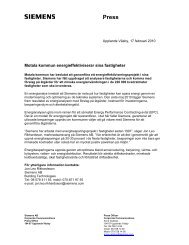European Green City Index - Siemens
European Green City Index - Siemens
European Green City Index - Siemens
You also want an ePaper? Increase the reach of your titles
YUMPU automatically turns print PDFs into web optimized ePapers that Google loves.
<strong>European</strong> <strong>Green</strong> <strong>City</strong> <strong>Index</strong> | <strong>City</strong> Portrait<br />
Athens_Greece<br />
Select city data<br />
Population: 3.4 million<br />
GDP per head, PPP: € 29,641<br />
CO2 emissions per head: 5.92 tonnes*<br />
Energy consumption per head:<br />
Percentage of renewable energy<br />
88.77 gigajoules*<br />
consumed by the city: 2.66 %<br />
Total percentage of citizens walking,<br />
cycling or taking public transport to work: 65.5 %<br />
Annual water consumption per head: 106.88 m3 Share of waste recycled: 10 %<br />
* Estimate<br />
Although Greece’s capital, Athens, accounts<br />
for just under one-third of its total population,<br />
it contributed approximately one-half of<br />
the country’s GDP in 2007. As has occurred in<br />
other developed cities, there has been a shift<br />
from industrial production to business-related<br />
services, such as shipping and tourism, over the<br />
past decade. In 2001 industry accounted for<br />
16.7% of total gross value added in Athens. By<br />
2006 this figure had fallen to 13.2%.<br />
Athens ranked 22nd out of 30 countries in<br />
the <strong>European</strong> <strong>Green</strong> Cities <strong>Index</strong> with a score of<br />
53.09 out of 100. The city’s overall score was<br />
constrained by its air quality, its performance on<br />
waste and land use, and the green credentials of<br />
its buildings. However, its score was bolstered by<br />
its environmental policies on water and transport.<br />
Athens’ environmental programme is divided<br />
between the city and various ministries at the<br />
national level. With several overlapping jurisdictions,<br />
the city must often receive approval from<br />
a designated ministry in order to move ahead<br />
with an initiative, which can delay the planning<br />
and implementation of programmes.<br />
CO2 emissions: Precise data on carbon dioxide<br />
(CO2) emissions are not available for Athens, but<br />
based on estimates made from fuel combustion<br />
in the city, it ranks joint 17th overall, with<br />
Budapest. It emits approximately 6 tonnes of<br />
CO2 per inhabitant per year, slightly higher than<br />
the 30-city average of 5 tonnes. At the national<br />
level, the government aims to ensure that CO2<br />
emissions are no more than 25% higher in 2012<br />
than they were in 1990.<br />
Initiatives: Athens has been extending its subway<br />
train network since before the Olympic<br />
Games were held in the city in 2004, in order to<br />
reduce transport-related emissions.<br />
Energy: Athens ranks 15th overall in energy,<br />
largely because of its high levels of energy con-<br />
sumption per head — nearly 89 gigajoules per<br />
inhabitant in 2006, compared with a 30-city<br />
average of about 81 gigajoules. Less than 4% of<br />
Athens’s energy is derived from renewable<br />
sources, compared with the 30-city average of<br />
about 7%.<br />
Initiatives: To boost the availability of renewable<br />
energy, around 270 wind turbines have<br />
been established around Athens, with a total<br />
capacity of around 160,000 kw.<br />
Buildings: Athens ranks 22nd overall for buildings,<br />
in large part because of the city’s lack of<br />
energy-efficient building standards or incentives.<br />
With residential buildings consuming an<br />
estimated 695 megajoules per square metre per<br />
year, Athens ranks behind other cities with high<br />
average temperatures.<br />
The city is also held back by an absence of<br />
energy-efficiency regulations for new buildings<br />
and incentives to construct efficient new buildings<br />
(or retrofit old ones).<br />
Initiatives: Although not yet implemented,<br />
there is a bill under discussion at national level to<br />
introduce energy performance certificates.<br />
Transport: Athens ranks 17th overall for trans-<br />
port. The city has an extensive network of buses,<br />
many of which are fuelled by compressed natural<br />
gas (CNG), as well as yellow trolleys (electric<br />
trams). However, there is currently no network<br />
of cycle lanes or fast lanes for car-pooling. An<br />
estimated 56% of people take public transport<br />
to work, while a high degree of personal vehicle<br />
use persists, resulting in severe congestion.<br />
Initiatives: Athens has converted about 20% of<br />
its fleet of some 2,000 buses to run on CNG,<br />
which reduces overall emissions.<br />
Water: Athens ranks 15th overall for water and<br />
2nd among cities with hot climates. The city<br />
consumes nearly 105 cubic metres per person<br />
per year, almost identical to the 30-city average.<br />
It ranks slightly worse than average for water<br />
system leakages, with an estimated leakage rate<br />
of 25% (the average is about 23%).<br />
Waste and land use: Athens ranks 23rd for<br />
waste and land use, in large part because of its<br />
poor green land-use policies. It does score well<br />
(12th) for its municipal waste production, with<br />
around 465 kg of waste produced per inhabitant<br />
per year, below the 30-city average of 511 kg.<br />
The city has some strong initiatives under way to<br />
promote recycling activities. It also has a policy<br />
to contain sprawl in the city centre, but this does<br />
not apply to the suburbs. As a result, there is a<br />
significant degree of suburban sprawl.<br />
Initiatives: Athens has highlighted recycling as<br />
the core of its environmental agenda. Separate<br />
bins have been provided for glass, metals and<br />
batteries since 2005.<br />
Air quality: Athens ranks 25th overall for air<br />
quality. There is a daily public report on air pollution<br />
levels in Attica (Athens and its surrounding<br />
areas), measuring a range of emissions such as<br />
nitrogen dioxide, sulphur dioxide and particulate<br />
matter. However, the government has not<br />
stipulated specific targets for air quality. While<br />
Athens has high nitrogen dioxide and particulate<br />
matter emissions, it has low levels of ozone<br />
emissions.<br />
Initiatives: Athens has attempted to improve<br />
air quality by limiting traffic within the city. This<br />
has been achieved in part by allowing vehicles<br />
with odd-numbered licence plates into certain<br />
zones in the city on odd-numbered dates vehicles<br />
with even-numbered plates on even-numbered<br />
dates.<br />
Fluid education<br />
The water utility, EYDAP, has hosted an educational<br />
programme called “The Water Cycle“<br />
since 2002. This programme is targeted at local<br />
students who visit the EYDAP headquarters,<br />
and aims to increase awareness about rational<br />
water-resource management and<br />
wastewater treatment. The educational programme<br />
includes a detailed overview of water<br />
supply and sewerage facilities in the city from<br />
ancient times to today, including information<br />
on the transfer of water from reservoirs to water<br />
treatment plants and the treatment of water<br />
to make it potable. The Water Cycle programme<br />
has helped to raise awareness among<br />
younger generations about the significance of<br />
water throughout Athens’s history and about<br />
how to reduce the wastage of water. EYDAP<br />
aims to use knowledge about water to stimulate<br />
interest among the city’s youth in environmental<br />
areas.<br />
Environmental governance Energy<br />
6<br />
42 43<br />
Air Quality<br />
CO2<br />
10<br />
8<br />
4<br />
2<br />
0<br />
Buildings<br />
Waste and Land Use Transport<br />
Water<br />
Athens<br />
Best<br />
Average<br />
Environmental governance: Athens ranks<br />
21st, along with Dublin, in environmental governance.<br />
The city’s environmental programme is<br />
divided between the city authorities and various<br />
ministries in the national government, creating<br />
some confusion with respect to the boundaries<br />
of jurisdictions. While there is a dedicated environmental<br />
authority in Athens, many issues<br />
relating to the environment are dealt with by the<br />
Athens division at the Ministry of the Environment<br />
or by the Ministry of Transport. Consequently,<br />
the city’s environmental programme is<br />
piecemeal and provides few actual targets.

















